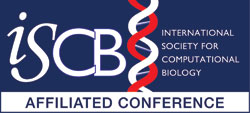Cancer is commonly described as a “disease of the genes” to remark its molecular and genetic origin. More recently this concept is evolving towards a definition of cancer as a “disease of the pathways” that makes clear the need of involving Computational Systems Biology approaches in the analysis of cancer data.
In this presentation I will describe some of the possibilities and limitations of the current methods for the analysis of cancer genome data in terms of pathways, with particular emphasis in those areas of Computational Biology closer to the scientific activity of my group, including the prediction of the consequences of point mutations (Izarzugaza et al., 2011, 2012), the extrapolation of the information at the level of pathway and functional classes (Vazquez et al., 2012).
In more detail my group is interested in the use of protein networks as a framework for the analysis of the relations between mutated proteins and functional properties, including the study of concerted evolution (co-evolution) between interacting protein families (Juan et al., 2008), the detection of the residues potentially responsible of binding specificity (Rausell et al., 2010), and the potential implications of these and other developments for modeling protein complexes (Wass et al., 2011). Developments that are part of our proposal (Baudot et al., 2009) for the use of interaction networks to connect disease associated genetic variants with the biomedical meta-information (see Glaab et al,. 2011, 2012 , Garcia-Jimenez et al., 2012).
The experience in both, large-scale cancer genome projects and personalize-cancer treatment cases, make obvious the need of developing simultaneously efficient information extraction systems able to complement the available databases/repositories and new computational approaches for the extrapolation of genetic information to the phenotypic/pathway level.
- BaudotA, de la Torre V, Valencia A (2010) Mutated genes, pathways and processes in tumours. EMBO Rep. 11(10):805-10.
- Garcia-Jimenez B, Pons T, Sanchis A, Valencia A (2012) Sequence Features and Interactions for RelationalLearning-based Human Reactome Pathway Expansion. Submitted
- GlaabE, Baudot A, KrasnogorN, Schneider R, Valencia A (2012) EnrichNet: network-based gene set enrichment análisis. Submitted
- GlaabE, Baudot A, Krasnogor N, Valencia A (2010) Extending pathways and processes using molecular interaction networks to analyse cancer genome data. BMC Bioinformatics. 13;11:597.
- Izarzugaza JM, del Pozo A , Vazquez M, ValenciaA (2012) Prioritization of pathogenic mutations in the protein kinase superfamily. BMC Genomics in press 2012
- IzarzugazaJM, Hopcroft LE, Baresic A, Orengo CA, Martin AC, Valencia A (2011) Characterization of pathogenic germline mutations in human protein kinases. BMC Bioinformatics. 12 Suppl 4:S1
- JuanD, Pazos F, Valencia A (2008) High-confidence prediction of global interactomes based on genome-wide coevolutionary networks. Proc Natl Acad Sci U S A. 105(3):934-9.
- Rausell A, Juan D, Pazos F, Valencia A (2010) Protein interactions and ligand binding: from protein subfamilies to functional specificity. Proc Natl Acad Sci U S A. 107(5):1995-2000
- Vazquez M, et al, in preparation.
- Wass MN, Fuentes G, Pons C, Pazos F, Valencia A (2011) Towards the prediction of protein interaction partners using physical docking. Mol Syst Biol. 7:469.





